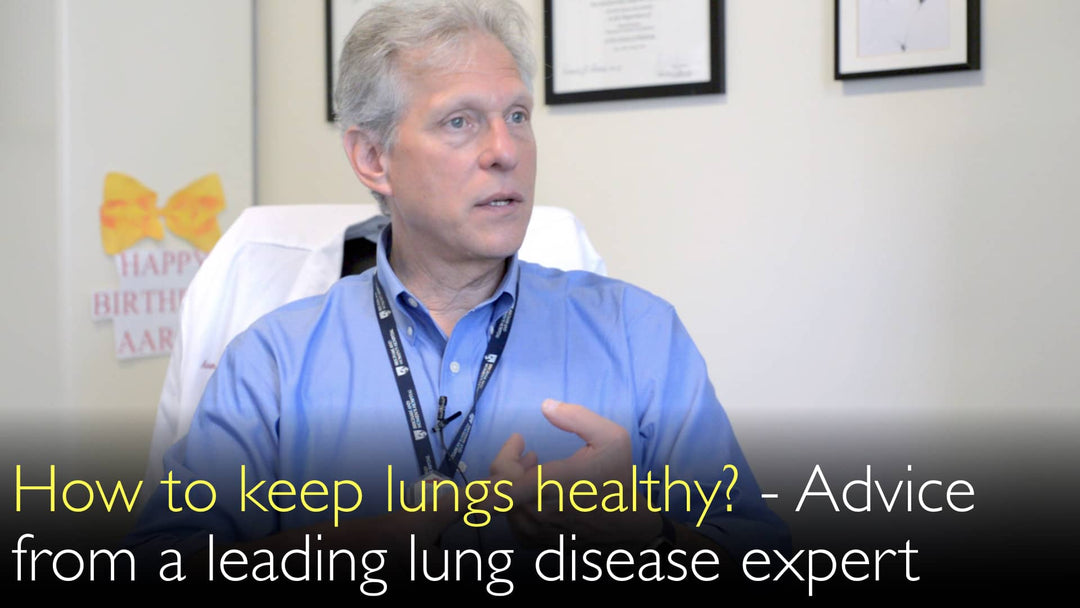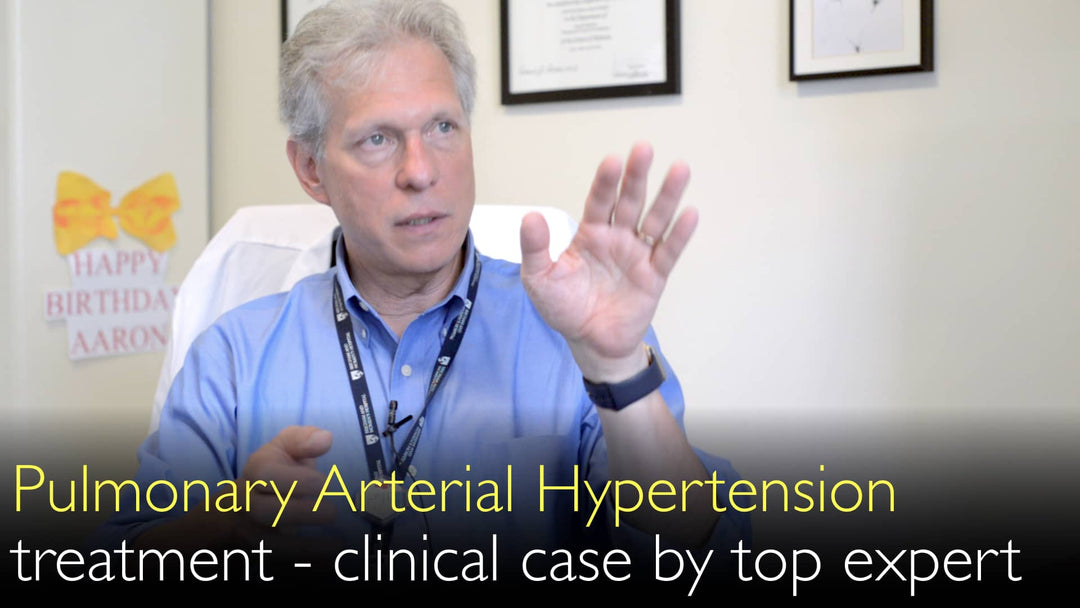Leading expert in pulmonary hypertension and heart failure, Dr. Aaron Waxman, MD, explains how to keep lungs healthy. He details the critical link between lung and heart health. Dr. Aaron Waxman, MD, emphasizes the importance of exercise for lung fitness and vascular recruitment. He also advises avoiding smoking and environmental pollutants. A balanced diet and strength training complement aerobic conditioning for optimal lung function.
Optimizing Lung Health: Expert Strategies for Pulmonary Fitness and Disease Prevention
Jump To Section
- Lung and Heart Connection
- Lung Vascular Reserve
- Exercise Benefits for Lungs
- Beyond Exercise Strategies
- Lifestyle and Nutrition Advice
- Full Transcript
Lung and Heart Connection
Dr. Aaron Waxman, MD, highlights the inseparable link between lung health and heart health. He explains that the lungs are the only organ that receives the entire cardiac output from the heart with every single heartbeat. This massive volume of blood is equal to the entire blood supply sent to all other body vessels combined. This physiological fact makes maintaining a healthy pulmonary vascular system absolutely critical for overall health.
Lung Vascular Reserve
The lung possesses a remarkable ability to accommodate vastly different blood flow rates. Dr. Waxman describes how at rest, the heart pumps approximately 4.5 liters of blood per minute through the lungs. During intense exercise, a strong athlete can increase this cardiac output to between 15 and 20 liters per minute. The lung's huge reserve of vessels can open up and recruit to handle this increased flow. In a healthy person, pulmonary vascular resistance decreases dramatically during physical exertion to facilitate this process.
Exercise Benefits for Lungs
Dr. Aaron Waxman, MD, strongly promotes exercise for all patients, including those with existing lung disease. He states that exercise is a huge bonus for the lung because it teaches the organ to adapt to increased blood flow. As you train, the lungs learn to recruit blood vessels more efficiently. This training effect improves not only lung fitness but also cardiac fitness and muscle perfusion at the microcirculatory level. Dr. Aaron Waxman, MD, notes that this leads to increased mitochondrial density and better energy production throughout the body.
Beyond Exercise Strategies
During the interview with Dr. Anton Titov, MD, the discussion turned to strategies beyond physical activity. Dr. Waxman acknowledges that environmental factors play a significant role in lung health. He strongly advises staying away from smoking, which remains a primary cause of preventable lung disease. He also recommends avoiding other unhealthy airborne pollutants whenever possible. While controlling the general environment is challenging for individuals, making conscious choices to reduce exposure is beneficial.
Lifestyle and Nutrition Advice
Dr. Aaron Waxman, MD, concludes with holistic lifestyle recommendations for optimal lung health. He advocates for a balanced nutritional approach without endorsing any specific diet trend. The key is to avoid excessive eating while ensuring proper nutrient intake. From an exercise standpoint, he recommends a powerful combination of aerobic conditioning with simple strength training. Dr. Waxman finds that this integrated approach helps people feel significantly better and dramatically improves their functional lung capacity for daily activities.
Full Transcript
Dr. Anton Titov, MD: Lung health and heart health are tightly linked. One organ, the lungs, absorbs all blood that the heart pumps out. It is equal to the entire body's blood vessels!
Lung health advice from a top expert in pulmonary hypertension and heart failure. Lungs are the only human organ that receives the entire volume of blood that the heart pumps out with every heartbeat, with every ejection.
This is a very important question. How to keep lungs healthy?
Is there a "lung training protocol" to optimize lung function?
Obviously, not smoking is an important part of keeping lungs healthy. But could we go beyond not smoking advice?
Because there are many people who don't smoke. They are interested to know how to keep lungs healthy all your life.
Dr. Aaron Waxman, MD: Lung health is connected with cardiovascular health and total body health. One of the unique features of the lung is that it does take the entire cardiac output. The left heart has the opportunity to pump out blood to the entire body.
We have to think about the complexity of the lung circulation. The lung has to accommodate all that blood supply.
Think about the transition from rest to exercise. At rest, we are pumping about 4.5 liters of blood per minute, so the lung vessels just have to accommodate that.
Now you start to do exercise. If you are a strong athlete, you may increase that cardiac output to 15 to 20 liters per minute. All those blood vessels in the lung have to open up and accommodate more blood.
The lung has a huge reserve of vessels that it can recruit. Lungs can open and accommodate increased blood flow from the heart without any trouble.
We see in the normal person that the pulmonary vascular resistance will go down dramatically during physical exercise. Cardiac output increases during exercise and lung vascular resistance decreases.
But in the patient with lung disease, we run into trouble, especially with right-sided heart function, because blood vessels in the lung are not able to accommodate all blood flow from the heart.
But even in patients with lung disease, exercise is a huge bonus to the lung. The more you exercise, the better is your lung fitness.
Dr. Anton Titov, MD: You also get better cardiac fitness, of course.
Dr. Aaron Waxman, MD: The lung learns how to adapt to increased blood flow from the heart during exercise. Lungs can recruit those blood vessels better as you train.
That also brings up the whole issue of blood perfusion to the muscles. The more you exercise, the better the perfusion of the muscles. This is true especially at the microcirculatory level.
That means you have more mitochondria. It means more energy production. Body physiology starts to match itself and accommodate and adapt to whatever the patient’s disease.
We promote exercise for all of our patients.
Dr. Anton Titov, MD: Is there any particular strategy apart from exercise to keep lungs healthy?
Maybe a lifestyle and perhaps dietary or even chemopreventive strategy for lung disease prevention?
Obviously, the environment is very important. There is only so much we can do with the environment. But certainly staying away from smoking is important. Staying away from things that are not healthy in the air.
Dr. Aaron Waxman, MD: But again, it is hard to control the environment. But a balanced nutritional approach to lifestyle is always good.
There are all different kinds of diets people use. But as long as it is a well balanced and not excessive diet, then it is good.
From an exercise standpoint, a combination of aerobic conditioning along with some simple strength training makes people feel a whole lot better. They are able to do a lot more with their lungs.






